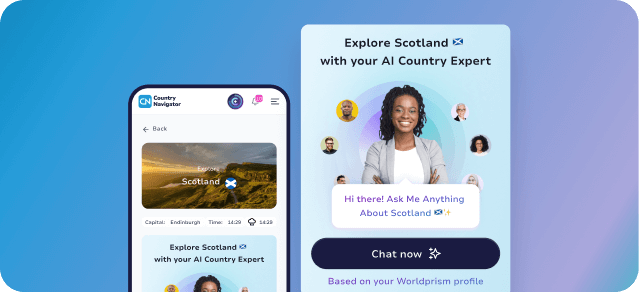Set your new hires up for success
Cross-cultural management – the secret to managing well
.jpg)
“Management is nothing more than motivating other people.”
– Lee Iacocca, former CEO of Chrysler
“The conventional definition of management is getting work done through people…”
– Agha Hasan Abedi, Founder of BCCI
Managers often get a bad rap. It’s a tough job—and while everyone notices when it goes wrong, few recognize the countless times it goes right.
The biggest challenge? People. A manager has the least control over the most important variable: human beings. People are brilliant and unpredictable, driven and difficult. And when you add cultural diversity into the mix, things get even more complex. Cross-cultural management is not for the faint-hearted!
So how do you handle cultural differences in the workplace as a manager? Every team has its own quirks: the one who resists anything new, constantly clashing with the early adopter. The early bird who side-eyes the latecomer. The storyteller who rambles with tangents, always getting cut off by the colleague who jumps to the punchline.
It’s tempting to try and iron out those differences. Wouldn’t it be easier if everyone thought, worked, and communicated the same way?
Actually, no. The data says otherwise.
The Power of Diversity (When Managed Right)
It turns out that cultural differences in the workplace can be a superpower.
In an analysis of more than 9 million scientific papers, cross-cultural research teams produced work with a 10.63% higher research impact than more culturally homogenous teams or individuals. Diversity, it turns out, fuels excellence source: Nature, 2020.
Another study published in the Personality and Social Psychology Bulletin found that cross-cultural teams are more likely to evaluate facts more thoroughly and generate more creative solutions source: Katherine W. Phillips, 2009.
But—and this is key—these benefits only emerge when teams are led with psychological safety and cultural intelligence.
Without that, difference causes friction. With it, difference drives brilliance.
The Manager’s Edge: Cultural Intelligence (CQ)
To truly motivate and mobilize a cross-cultural team, you need more than just people skills. Cross-cultural management needs a specific competency: Cultural Intelligence (CQ).
CQ is the ability to recognize, understand, and use cultural differences to your advantage. It has four pillars:
1. Attitude
It starts with mindset. The best managers are curious, open to change, and ready to learn. They see difference not as a threat, but as an opportunity.
2. Awareness
With the right attitude, managers become more attuned to how culture shapes behavior, decision-making, and team dynamics. Tools like Worldprism (free trial available) can help map your team’s cultural values and highlight both shared ground and friction points.
This is data with a purpose: understanding cultural styles helps prevent misunderstandings—and unlocks potential.
3. Knowledge
Awareness must translate into insight. What are your team members’ default working styles? What motivates them? What frustrates them?
Once you know this, you can match people intentionally. A logical thinker can ground a visionary. A task-focused colleague keeps momentum while a relationship-oriented peer builds trust. Each person brings a lifetime of perspective—when you understand what drives them, you unlock performance.
4. Skills
The final step: action. Cultural intelligence isn’t theoretical—it’s practical. With CQ, managers develop sharper communication, facilitate more productive discussions, and create a climate where collaboration thrives. And that’s where managers add real value:
- Feedback that inspires growth.
- Meetings that energize, not drain.
- Communication that lands, not confuses.
- Conflict that builds, not breaks.
The result? A team that’s motivated, inclusive, and productive. One that hits deadlines, solves problems, and keeps stakeholders smiling.
Three Things You Can Do Right Now
Here’s how to start weaving CQ into your leadership:
1. Map your cultural profile.
Use a tool like Worldprism to explore your own values—and invite your team to do the same. Look at where you’re aligned, and where there’s diversity. Both matter.
2. Use AI as your coach.
Try this prompt with your preferred AI assistant:
“Coach me on developing cultural intelligence to lead a diverse team. My team includes people from [insert countries]. Help me adapt my leadership style, improve communication, and build trust across cultures. Also help me reflect on my own cultural lens.”
If you have access to Country Navigator, use Carla, the AI CQ coach for even sharper suggestions that link back to your own Worldprism cultural profile.
3. Get talking about culture.
Invite your team to share how their cultural values shape how they work. Turn these insights into real discussions about how difference can drive success.
Bonus: Find a mentor.
An internal mentor who understands your role can challenge you in ways a generic coach can’t. Ask them to help you see what’s happening culturally in your team—and hold you accountable for action.
Need a hand?
If you’re ready to start—but not sure how—get in touch. Even if you don’t have budget, we’re happy to help point you in the right direction.
We’ve got over three decades of experience supporting over 1 million people worldwide. We’re passionate about delivering change; how can we help you?

Matthew Maclachlan
Matthew MacLachlan is a seasoned expert in cultural intelligence and inclusion, currently serving as the Head of Learning Innovation at Country Navigator. With over two decades of experience, he designs innovative learning solutions to foster culturally intelligent and inclusive organizations. Matthew's career spans roles such as Learning and Development Manager at the University of Surrey, Head of Intercultural and Communication Skills at Learnlight, and Intercultural Account Manager at Farnham Castle. An advocate for practical, research-backed learning, he co-hosts the "Hippo Question Podcast" on cultural intelligence and inclusion. More posts by Matthew MaclachlanRelated articles
Ready to get started?
Kickstart your cultural intelligence journey and try our
no-obligation free trial for 14 days
Join companies already using Country Navigator




COMMENTS